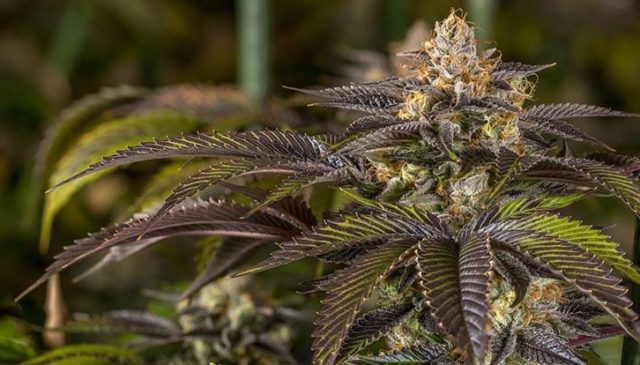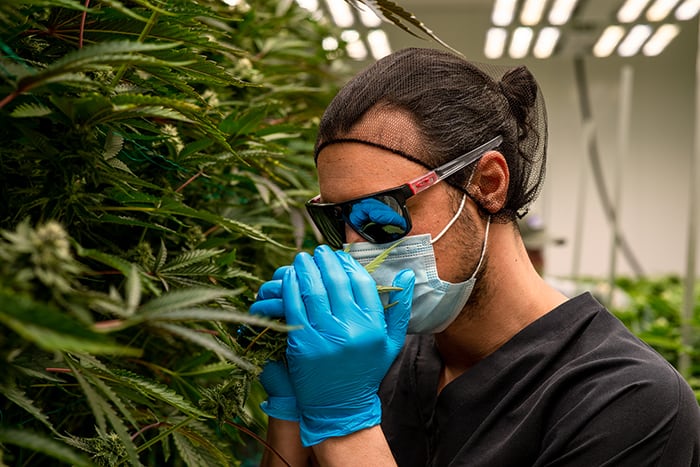
Name: Marlon Mallas
Location: Evart, Mich.
Title: General Manager, Cultivation, Lume Cannabis Co.
One word to describe your cultivation style: Innovative
Indoor, outdoor, greenhouse or a combination: Indoor
Can you share a bit of your background and how you and your company got to the present day?
The base of my knowledge and experience in cannabis came from working with a biopharmaceutical company out of Nevada that developed and patented compounds derived from cannabis for use as treatments and therapeutics for certain ailments and diseases. We also grew cannabis on a commercial scale through tissue culture and micropropagation, a process designed to preserve genetics and remove unwanted diseases and infections in plants. It was an amazing experience to work with a science-based company involved in cannabis, and it provided a great foundation for future endeavors.
As Michigan was gearing up to legalize cannabis recreationally, I was brought on board by a very ambitious start-up cannabis company. At the time, the company had only one retail store and was in the process of building their first cultivation. We finished construction of the cultivation and opened the doors with less than a dozen people. Fast forward 18 months, we now have 14 stores and will be opening many more before the end of the year. We are also opening the doors at our second cultivation, which is one of the most advanced cannabis cultivations ever built. As a whole, we now employ almost 500 people.
What tool or software in your cultivation space can you not live without?
Oof, that’s a loaded question. We’ve custom-built a prototype grow room from the mechanics to the fertigation system to the structure and everything in between. We custom designed the software that runs and tracks everything in the room. We can measure the moisture in the root zone, the volume of moisture pulled out of the air from transpiration, and even the amount of power the room consumes. However, the devils in the details. The data alone means nothing. The technology behind the infrastructure and the use of the data is what makes all the difference.
Also, we are fortunate enough to have [a] project manager that happens to be a coder (shout out to Thilo Savage). He builds us custom tools that fit our business practice, capable of scrubbing the massive amount of data collected at the cultivation and digesting the information in a way that helps us guide our decision making.
What purchase of $100 or less has most positively impacted your business in the last six months?
This is an interesting question. Nothing is cheap in cannabis at this scale. You don’t just buy one pair of trim scissors, you buy 50. Grow supplies are brought in by the truck load.
What cultivation technique are you most interested in right now, and what are you actively studying (the most)?
I wouldn’t consider most of what we are studying cultivation techniques. Our techniques are tried and true. What we are studying are things like the creation of synthetic seeds through tissue culture; identifying specific strains of viruses in cannabis; the actual effect of vapor pressure deficit on yield; the correlation between root zone dry back and vigor—the list goes on and on. Not to get too much in the weeds of plant biology, but the hottest topic lately has been determining the cause of enlarged styles in specific genetics.
How has a failure, or apparent failure, set you up for later success? Do you have a “favorite failure” of yours?
Complacency is a killer. It’s important not to take your foot of the gas when things are going well. Don’t shrug off the little things that keep the wheels turning. It’s rough when the small things get overlooked because they are seemingly insignificant but actually have a real tangible impact. It seems obvious, but how clean you keep your grow will directly affect your microbial test results. It’s all in the details.

Photo courtesy of Lume Cannabis Co.
What advice would you give to a smart, driven grower about to enter the legal, regulated industry? What advice should they ignore?
I love this question. [My advice is,] have some humility! Every grower you meet is the best grower ever (according to their ego). Don’t be that person. Don’t be afraid to get your hands dirty. Take pride in your work and work area. Be open to new ideas. Respect recordable results instead of anecdotal evidence. Have the discipline to learn your craft. Be reliable and be consistent. I’ve seen many growers that struggle going from being the sole person taking care of their crop to working with a large team of growers. If you go in with the mindset that your way is better than everyone else’s, you will not last. If you want to level up, it’s not enough to link up with people that grow pot well. Link up with innovators and people that are driven by the science. However, it is important to gain experience where you can when you can. Never underestimate the power of perception.
Ignore people that tell you a certain way is better unless they show proof.
How do you deal with burnout?
I remind myself of the surrealness of living the dream of working in cannabis. I remember when we were getting through our first several harvests and we were at a point that we were growing weed much faster than we could package it. We began having a hard time storing and organizing the large stockpile of product. I remember frustration building as a friend/coworker and I shuffled around many 30-gallon drums, completely filled with pot. There was moment when I stopped for a second and watched my friend sigh at the task of sorting and organizing a literal ton of cannabis. I laughed, he laughed, the weed laughed—it was great. Sometimes you have to take a second, look around, and smell the flowers.
How do you motivate your employees/team?
I express my passion and enthusiasm for what we are doing. We are far from your typical cannabis company. We have the incredible opportunity to be at the forefront of a new industry, and sometimes people just need a little reminder of that. It also helps that our pay and benefits are very competitive.
What keeps you awake at night?
The thought of losing a crop. We have a very hearty infrastructure and a stellar team, but the thought still makes me nervous.
What helps you sleep at night?
As far as the facility goes, we are capable of operating without grid power or city water supply for long periods of time in emergency situations. It’s pretty incredible. I have to remind myself that we are dialed and battle tested. We’ve dealt with late-night power losses from storms and blown transformer fuses and have never skipped a beat. We have a great team to thank for making adverse situations, which would otherwise be catastrophic, become minor hiccups (shout out to Gary Stalter).
Another thing that helps me sleep is my confidence in our team, everything from our cultivation, to our retails, to our corporate. I am humbled by the support and teamwork.
The biggest thing that helps me sleep is knowing we are growing incredibly clean cannabis. We have a team of very passionate growers that take great pride in making sure we are providing the best medicine. Nothing leaves the facility without both third-party testing and consensus from the growers.
Editor’s Note: This interview has been edited for style, length and clarity.
